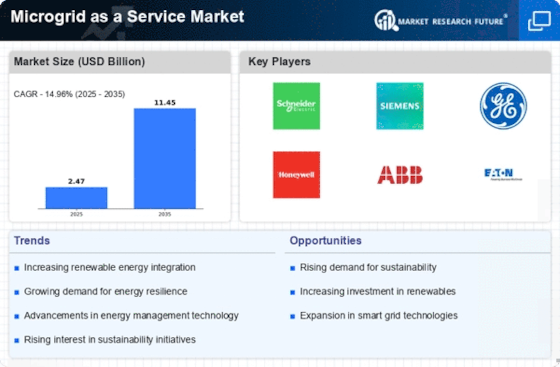Market Analysis
In-depth Analysis of Microgrid as a Service Market Industry Landscape
The market dynamics of Microgrid as a Service (MaaS) have changed significantly through a crossroad of technology, ecological concerns and increasing number of consumers looking for firm and eco-sensible energy solutions. With MaaS, small scale service providers start offering comprehensive microgrid solutions to end clients. In such way no up-front investments are needed and customers themselves don’t need the engineering skills. An important element of the MaaS market stems from the growing mobilization and spreading of the appropriate energy assets (DERs) for the purpose of achieving energy security and reliability. MaaS enters the scene as a versatile and scalable model designed for the transition of centralized power structures towards decentralized network arrangements.
Renewable energy has also had a huge impact on the growth of the MaaS market and MaaS dynamics. At the state level in particularly, there are stringent regulations being implemented and people are aware and willing to adopt clean energy measures. This occasioned the insertion of the renewable assets into microgrids, which made them more sustainable and environmentally positive. With the motto, MaaS suppliers are now responding to this trend by affording options of solar, wind, and other renewable sources, covering financial and environmental issues.
Further, the heightened frequency and gravity of these climate catastrophes have spotlight the weakness of centralized energy systems. The Micro-grids driven by the MaaS model have become an alternative solution. Such strategies can be stand-alone or coupled with the main Grid, which contributes to the uninterrupted supply of energy under problems or catastrophes occurring in the network. As microgrids offer reliability and adaptability as a key saleable feature, organizations, college campuses, and network systems aim at controlling the impact of blackouts by considering them.
The MaaS industry also opens door to companies aspiring for upgrading their energy use and reducing their operational expenditures, which is a new source of revenue. By the use of smart energy management and control platforms, MaaS providers provide a tool to their customers for on-time monitoring, analysis and optimization of energy utilization. Through the data-driven approach, energy efficiency is improved and it opens up the opportunity to make smart decisions on the management of loads which ends up in substantial cost reduction.


















Leave a Comment